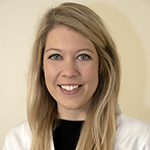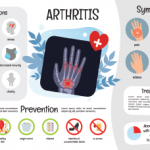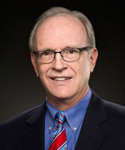Dr. Helmick also helped bring more focus to lupus by launching the Lupus Program in 2003, starting several lupus registries and conducting longitudinal studies of both arthritis and lupus. He has received multiple awards for his work, including the 2012 ACR Award for Public Leadership in Rheumatology and the 2016 Association of Rheumatology Professionals (ARP) President’s Award.
“It was a great run at [the] CDC, and that’s what kept me around,” he says.
Amanda S. Alexander, MD, Now Leads Rheumatology Fellowship Program at UAB
Within four years of her arrival at the University of Alabama–Birmingham (UAB) for a rheumatology fellowship, Amanda S. Alexander, MD, joined the staff as an assistant professor in the Division of Clinical Immunology and Rheumatology and also became an associate program director of the Rheumatology Fellowship Program. Last fall, she was appointed director of that program and has been implementing her goals in 2022.
When Dr. Alexander became the director, she said, “I really wanted to help fellows find their passion in rheumatology, and at the same time, help them with their individual career goals.”
She is passionate about creating an atmosphere that encourages scholarship, research, leadership and wellness to prepare fellows for their future careers. Whether a fellow is aiming for a career in clinical investigation, academics or private practice, her job is to model how to be a good leader in any of those roles—and how “to be the best physician for their patients.”
Dr. Alexander has been active with the ACR, serving as a member of the Government Affairs Committee, and in 2021 managing the Advocacy 101 program. Her involvement with advocacy stemmed from the economic disparities that patients experience in the South. Her advocacy has ranged from helping remove Medicare coverage caps for annual physical therapy allotments, to outreach with colleagues and government representatives.
The first year of the fellowship program at UAB’s Division of Rheumatology covers the same curriculum for all; in years two and three, the program is differentiated, and fellows are matched with a mentor. Dr. Alexander is eager to empower fellows to be educators—“not only to residents and medical students with whom they work, but also with their patients.”
Connecting during the pandemic created challenges, as well as opportunities, for educators, she notes. Incorporating a wellness component for fellows entailed some group outdoor activities, such as 5K runs and a Pilates class, even a visit to a nail spa. When in-person events were restricted, Dr. Alexander notes that more frequent virtual check-ins with fellows were essential.




